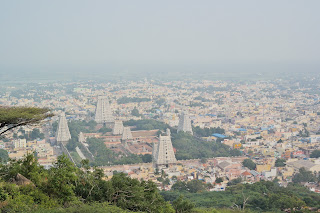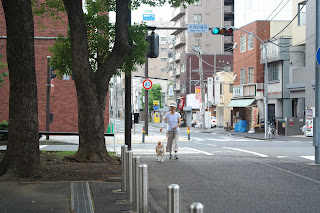It was an early Margazhi (winter month) morning in Thiruvannamalai, Raviena, Greeja and I decided to do the Girivalam (circumambulate the Arunachala Hill). It was our first trip to Thiruvannamalai, Raviena was about 13 years old then. We stayed at the Ramana Ashram, and Baskar, our driver then and whom I now regard as my younger brother and member of my family, dropped us at the entrance of Annamalai Temple, to begin our Girivalam. He was definitely tired after yesterday's drive from the South, and I asked him to take rest, whilst we take the 14.5km walk around Arunachala Hill.
We paid obeisance to Annamalaiyaan at the entrance, and we started to walk, but not more than 20 meters on, it started to rain. I was apprehensive to continue, but Raviena said, "Lets go Pappa, after all how often do we get to walk in the rain?". Whilst I was contemplating, a dog came along, stood in front of us, in the rain, and gave this look as though telling us, "what are you guys waiting for, lets go, after all it's just rain." With Raviena's insistence and after Greeja gave the nod, we started walking. The moment we took our steps, the dog which was in front of us started to walk as well. By then the rain started to become even heavier, but the dog kept on ahead of us, as though showing us the way.
In our minds we thought the dog was hungry and was hoping for some food from us. Greeja being Greeja who always has a soft spot for animals, said to me "lets stop by at any shop to get some biscuits for the dog". Since it was very early in the morning, shops were not opened yet, and we hoped at least to find one which would be opened along the way. We had walked almost 6km, the rain was unabating, and the dog was still with us. Finally we chanced upon a tea stall which was open and we made a pitstop there. We ordered coffee and Greeja got some biscuits for the dog. Whilst we had entered the tea stall, the dog obediently waited just outside the stall under the shed, and Greeja gave the biscuits to the dog, which it devoured happily.
So we thought that it will be over with the dog, since we had already fed it. As we got up to continue our walk, the dog also stood up and just like before it went ahead, as though escorting us. Very interestingly, along our walk we also encountered many packs of stray dogs trying to lunge at us, but at every encounter, our canine escort went ahead and chased them away. This was definitely getting weird, because such things don't normally happen, a dog walking in a pouring rain, escorting a family of three with which it had no previous relationship with. Mind you at certain stretches of the road, especially as we entered the town before reaching the temple, the roads were flooded above our ankle, and the dog was with us all the way, wading through the water.
Finally we completed our 14.5km walk, we were back at the entrance of Annamalaiyaan Temple. Paid our homage, seeking the blessings of Annamalai and Unnamalai, and all these was happening under the watchful eyes of the dog. We decided to head to a restaurant just next to the temple for a quick breakfast and most importantly Greeja wanted to feed the dog with something substantial. We entered the restaurant, and the dog just stood outside, and Greeja said to the dog, "I will get you some food, so just wait a while." We went in and asked to pack some idlly with sambar for the dog, but when Greeja came out with the food, the dog was nowhere to be seen. We asked around from the people who were there and all of them said that they did not see any dog in the first place.
We were left flabbergastered. When we narrated the story to Baskar, he mentioned that in his conversation with one of the Annamalai temple flower shop owners, she apparently said that the Aruncahala Hill, since time immemorial has been the abode of Siddhars (Enlightened Ones). They seek homage in Arunachala Hill, which they see as a Divine entity. Ancient seers descripted Arunachala hill as Agni Lingga. It has been said that Arunachala Hill was Agni (Fire) during the Krithayugam, was Manickam (Emerald) during Threthayugam, was Ponn (Gold) during Dwaprayugam and Kall (Rock) during Kaliyugam.
For those unfamiliar with these periods called Yugam, these terms are based on Hindu Cosmology that describes four ages of mankind that runs through a period of 4 million years, Currently we are in the age of Kali (Kaliyugam) which Hindu cosmologist calculated had started in the year 3102BCE and is supposed to run for 432,000 years.
According to the locals there and from my readings later, these Siddhars or seers take various forms presenting themselves to mortals as guides or protectors. The entire experience as narrated was exhilarating for all of us. For me personally, this whole episode opened a new beginning in my inner quest.
One thing that I have realised is that, every encounter has a purpose, some we realise immediately, and yet others, much later. My friendship with my colleague Valliappan who introduced me to the wisdoms of Ramana Maharishi, brought me to Thiruvannamalai. Greeja and I took abode to the peace and serenity of this place.
Today is Karthigai Deepam, an auspicious day for Arunachala. One of the earliest mentions of Karthigai celebration is recorded in Ahananuru (Sangam poem between 2nd BC - 3rd AD). In fact this event of Karthigai Deepam, pre-dates the celebration of Deepavali or Navarathri.
Though there are several Puranic stories that has been told to signify why we celebrate Karthigai Deepam festival, I will not dwell into that here. But from a philosophical perspective, a "lamp" has always been symbolically connected to spiritual pursuit. The lamp is existence, the oil is body and mind, the wick is our ego, the flame is the spiritual wisdom. As one achives a higher state of consciousness, like the flame, it diminishes worldly attachments, and it re-defines existence.
So Kaarthigai Deepam is not merely a celebration like any other festival be it Deepavali or Navarathri where it is celebrated owing to the victory of good over evil, but which is an act of spiritual significance.
For Greeja and I, Ramanashram and Arunachala Hill have attained primary significance in our lives. The journey began on that day, when we took our first step going around Arunachala Hill, inspite of heavy rain and that too being escorted by the dog. I will take that as an acknowledgement of my quest. It has been said that once one has visited Thiruvannamalai, he or she is bound to retun for future visits, which rings true in our case. Its like a magnetic pull or a calling of sorts. Since then we have made frequent visits every year. Our lives have changed.
Like any other journey to the unknown, there was never a dull moment, most of the time balancing the extremes. But being a Trekkie, I am inspired by William Shatner's famous quote, albeit a modified version, "To Boldly Go, Where 'Few Men Have' Gone Before."
To Everyone Observing Karthigai Deepam, Do Take This Opportunity To Self-Reflect and Have a Meaningful Thought While Lighting The Deepam (Lamp).
Ravi Varmman
0408
Subang Jaya
29112020





























